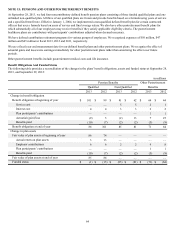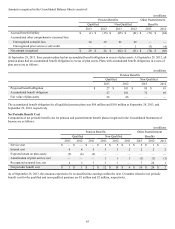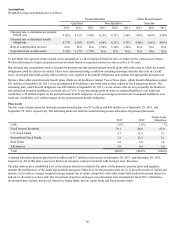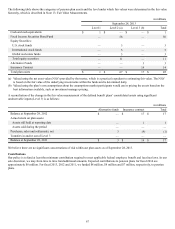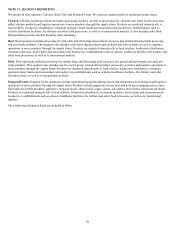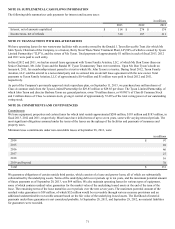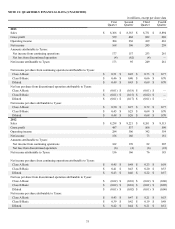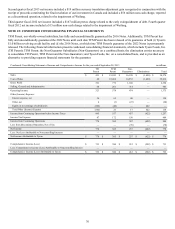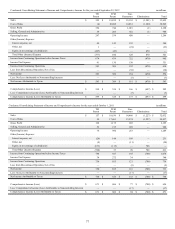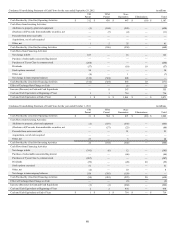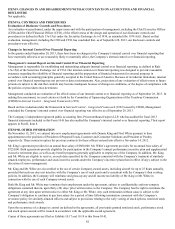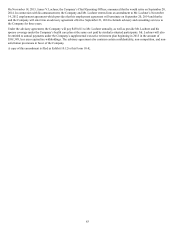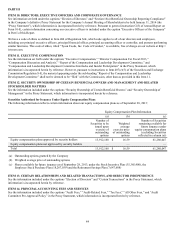Tyson Foods 2013 Annual Report Download - page 74
Download and view the complete annual report
Please find page 74 of the 2013 Tyson Foods annual report below. You can navigate through the pages in the report by either clicking on the pages listed below, or by using the keyword search tool below to find specific information within the annual report.74
On June 19, 2005, the Attorney General and the Secretary of the Environment of the State of Oklahoma filed a complaint in the U.S.
District Court for the Northern District of Oklahoma against us, three of our subsidiaries and six other poultry integrators. The
complaint, which was subsequently amended, asserts a number of state and federal causes of action including, but not limited to,
counts under Comprehensive Environmental Response, Compensation, and Liability Act (CERCLA), Resource Conservation and
Recovery Act (RCRA), and state-law public nuisance theories. The amended complaint asserts that defendants and certain contract
growers who are not named in the amended complaint polluted the surface waters, groundwater and associated drinking water supplies
of the Illinois River Watershed (IRW) through the land application of poultry litter. Oklahoma asserts that this alleged pollution has
also caused extensive injury to the environment (including soils and sediments) of the IRW and that the defendants have been unjustly
enriched. Oklahoma’s claims cover the entire IRW, which encompasses more than one million acres of land and the natural resources
(including lakes and waterways) contained therein. Oklahoma seeks wide-ranging relief, including injunctive relief, compensatory
damages in excess of $800 million, an unspecified amount in punitive damages and attorneys’ fees. We and the other defendants have
denied liability, asserted various defenses, and filed a third-party complaint that asserts claims against other persons and entities whose
activities may have contributed to the pollution alleged in the amended complaint. The district court has stayed proceedings on the
third party complaint pending resolution of Oklahoma’s claims against the defendants. On October 31, 2008, the defendants filed a
motion to dismiss for failure to join the Cherokee Nation as a required party or, in the alternative, for judgment as a matter of law
based on the plaintiffs’ lack of standing. This motion was granted in part and denied in part on July 22, 2009. In its ruling, the district
court dismissed Oklahoma’s claims for cost recovery and for natural resources damages under CERCLA and for unjust enrichment
under Oklahoma common law. This ruling also narrowed the scope of Oklahoma’s remaining claims by dismissing all damage claims
under its causes of action for Oklahoma common law nuisance, federal common law nuisance, and Oklahoma common law trespass,
leaving only its claims for injunctive relief for trial. On August 18, 2009, the Court granted partial summary judgment in favor of the
defendants on Oklahoma’s claims for violations of the Oklahoma Registered Poultry Feeding Operations Act. Oklahoma later
voluntarily dismissed the remainder of this claim. On September 2, 2009, the Cherokee Nation filed a motion to intervene in the
lawsuit. Its motion to intervene was denied on September 15, 2009, and the Cherokee Nation filed a notice of appeal of that ruling in
the Tenth Circuit Court of Appeals on September 17, 2009. A non-jury trial of the case began on September 24, 2009. At the close of
Oklahoma’s case-in-chief, the Court granted the defendants’ motions to dismiss claims based on RCRA, nuisance per se, and health
risks related to bacteria. The defense rested its case on January 13, 2010, and closing arguments were held on February 11, 2010. On
September 21, 2010, the Court of Appeals affirmed the district court’s denial of the Cherokee Nation’s motion to intervene. On
October 6, 2010, the Cherokee Nation and the State of Oklahoma filed a petition for rehearing or en banc review seeking
reconsideration of this ruling. The Court of Appeals denied this petition. The district court has not yet rendered its decision from the
trial, which ended in February 2010.


